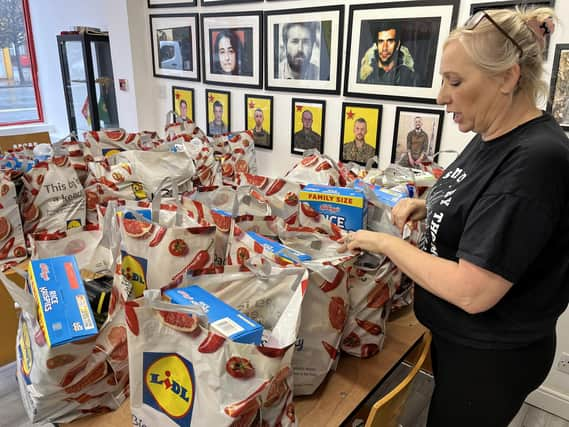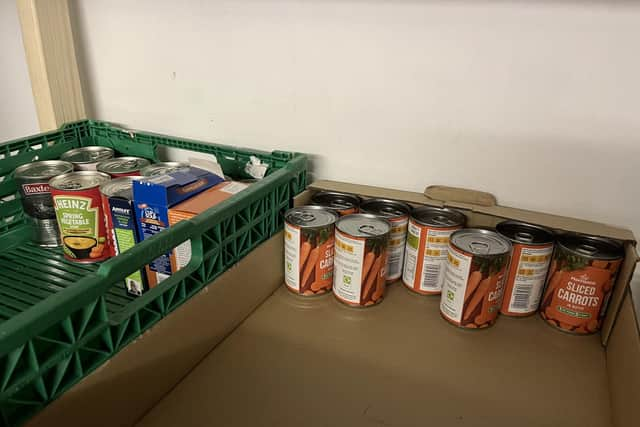What it's like to work a shift in a food bank in Yorkshire


It is Friday afternoon at a food bank in Hull and volunteers are already preparing for Christmas.
Volunteers at the Unity Shop, based in Spring Bank’s Kurdish Community Centre, are wrapping boxes of chocolate so the children they help have something to open on Christmas morning. While preparations for the festive season go on, on the other side of the room there is a more pressing need and that’s the reason volunteers gather here every single Friday.
Advertisement
Hide AdAdvertisement
Hide AdLines of shopping bags filled with bread, beans and other essentials sit ready to be collected or taken by volunteers to those in need across the city. Because for those who rely on the Unity Shop, these food parcels are not a gift but a lifeline.


From comfortable to struggling
The trade unions that run the food bank, launched in 2020 as the economic fallout from coronavirus intensified, are used to helping people in work. But now, instead of helping workers with just their pay and conditions, they now find they are having to make sure people with jobs can feed themselves.
When I volunteered at the Unity Shop for a shift, one of those who came for a food parcel said he was financially comfortable until his energy bills began rising. Now, as work from the bouncy castle business he works for dries up with the end of summer, he depends on the Unity Shop just to stay afloat. He tells me he worries more and more for the future because rising prices for food and bills all rise beyond his control just as his prospects for work dwindle. And he is not the only one, several more people pop in and out of the food bank during my time there.
All are grateful, some are warm, they smile and chat with the volunteers while records are checked and parcels handed out. Others come in quietly, keen to get what they need and leave rather than dwell on the circumstances they now find themselves in.
It never used to be like this
Advertisement
Hide AdAdvertisement
Hide AdThe Unity Shop has its suppliers, but it also depends on the goodwill of people and their donations. An elderly couple who arrive with bags of food are among them. They tell me the worsening cost of living crisis compelled them to do something. And they feel it is increasingly up to volunteers and organisations on the ground to do something about it, rather than waiting for the powers that be in Westminster.
I ask them if they have ever known a time that they could compare to now. In times of crisis, people often look to the past for solace and ways of comprehending the present, as we see with comparisons between now and the 1970s. But they say that even in those days and up until relatively recently, food banks did not even exist, let alone serve so many in work.
“In those days they had soup kitchens, that’s what things like this used to be called,” the man said. “But those were for people who’d fallen on really hard times, they weren’t like this. And in those days you’d hardly ever see beggars, at least not as many as you see now. Now when you walk down the high street you’ll see at least one person begging or sleeping rough.”
In the food bank’s store room, the importance of donations from people like the couple becomes clear. Joyce Marshall, who runs the food bank day-to-day, shows me the baskets where the food is kept. Some are reasonably well-stocked, but others which extend back across the shelves to the wall are down to their last few cans. Demand for the food bank’s services speaks for itself.
‘It’s a crime that we have to do this’
Advertisement
Hide AdAdvertisement
Hide AdJoe Gibbins, secretary of the Hull Trades Council which runs the Unity Shop, tells me they would rather not live in times where its services are required. But he adds the trade unions had no choice but to step in because the economic system was failing working people.
He says: “We believe in solidarity, not charity, many of the people who come here also volunteer for us. Most food banks also ask for a referral to get parcels, but the problem now is it’s not just people who can’t work or find a job who are struggling, it’s people in work too. The only reference you need to get our help is to tell us that you need food, and if they have other problems like addiction we’re not going to turn our noses up at them, it’s not for us to judge them.
“I think as we head into winter we’re going to be busier than we ever have been. Gas and electricity bills have already gone up and then there are future increases as well, people don’t have the capacity for that now. We don’t pride ourselves on running a food bank, we live in one of the biggest economies in the world it’s a crime that we have to do this. As trade unions, we’re trying to build a social movement so we can end hunger once and for all.”
To find out more about the Hull Unity Shop, including to donate or volunteer, visit their website: https://www.unityshop.co.uk/ or Facebook page: https://www.facebook.com/unityshophull/.